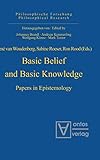Basic Belief and Basic Knowledge : Papers in Epistemology / ed. by René Woudenberg, Sabine Roeser, Ron Rood.
Material type: TextSeries: Philosophische Forschung / Philosophical Research ; 4Publisher: Berlin ; Boston : De Gruyter, [2013]Copyright date: ©2005Description: 1 online resource (300 p.)Content type:
TextSeries: Philosophische Forschung / Philosophical Research ; 4Publisher: Berlin ; Boston : De Gruyter, [2013]Copyright date: ©2005Description: 1 online resource (300 p.)Content type: - 9783110327274
- 9783110327519
- 100
- BD238.F68
- online - DeGruyter
- Issued also in print.
| Item type | Current library | Call number | URL | Status | Notes | Barcode | |
|---|---|---|---|---|---|---|---|
 eBook
eBook
|
Biblioteca "Angelicum" Pont. Univ. S.Tommaso d'Aquino Nuvola online | online - DeGruyter (Browse shelf(Opens below)) | Online access | Not for loan (Accesso limitato) | Accesso per gli utenti autorizzati / Access for authorized users | (dgr)9783110327519 |
Frontmatter -- Table of Contents -- Introduction -- Part I: Basic Belief and Basic Knowledge General Issues -- Intuitive Knowledge Reconsidered -- Foundationalism Strikes Back? In Search of Epistemically Basic Mental States -- Basic Beliefs, Coherence, and Bootstrap Confirmation -- Part II Areas of Basic Belief and Basic Knowledge -- A: Mathematics and Philosophy -- On the status of axioms in mathematics -- Mathematical Knowledge. A Defence of Modest and Sober Platonism -- A Trilemma for Philosophical Knowledge -- B: Religious Belief -- Defeaters and the Basicality of Theistic Belief -- Reforming Reformed Epistemology -- Why basic theistic belief is probably not warranted, even if it is true -- C: Morals, Testimony, and Proprioception -- Defending Moral Intuition -- Basic Beliefs, Testimony, and Blind-Trust -- Proprioception as Basic Knowledge of the Body -- About the Authors -- Backmatter
restricted access online access with authorization star
http://purl.org/coar/access_right/c_16ec
Over the last two decades foundationalism has been severely criticized. In response to this various alternatives to it have been advanced, notably coherentism. At the same time new versions of foundationalism were crafted, that were claimed to be immune to the earlier criticisms. This volume contains 12 papers in which various aspects of this dialectic are covered. A number of papers continue the trend to defend foundationalism, and foundationalism's commitment to basic beliefs and basic knowledge, against various attacks. Others aim to show that one important objection against coherentism, viz. that the notion of 'coherence' is too vague to be useful, can be countered.
Issued also in print.
Mode of access: Internet via World Wide Web.
In English.
Description based on online resource; title from PDF title page (publisher's Web site, viewed 28. Feb 2023)


